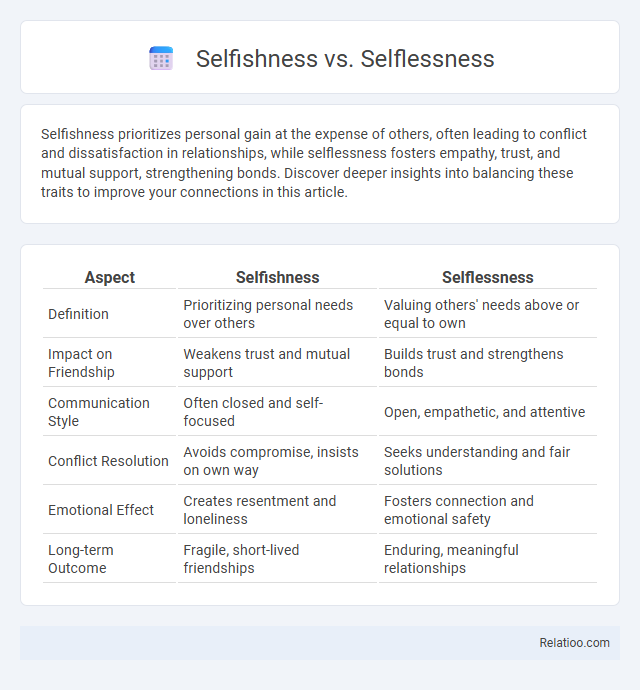Selfishness prioritizes personal gain at the expense of others, often leading to conflict and dissatisfaction in relationships, while selflessness fosters empathy, trust, and mutual support, strengthening bonds. Discover deeper insights into balancing these traits to improve your connections in this article.
Table of Comparison
| Aspect | Selfishness | Selflessness |
|---|---|---|
| Definition | Prioritizing personal needs over others | Valuing others' needs above or equal to own |
| Impact on Friendship | Weakens trust and mutual support | Builds trust and strengthens bonds |
| Communication Style | Often closed and self-focused | Open, empathetic, and attentive |
| Conflict Resolution | Avoids compromise, insists on own way | Seeks understanding and fair solutions |
| Emotional Effect | Creates resentment and loneliness | Fosters connection and emotional safety |
| Long-term Outcome | Fragile, short-lived friendships | Enduring, meaningful relationships |
Understanding Selfishness and Selflessness
Understanding selfishness involves recognizing actions driven primarily by personal gain, often at the expense of others, while selflessness emphasizes prioritizing others' needs without expecting anything in return. Your ability to balance these traits influences relationships and personal growth, highlighting the importance of empathy and boundaries. Distinguishing between healthy selfishness, which safeguards your well-being, and destructive selfishness, which harms others, is key to maintaining harmony.
Psychological Roots of Selfish Behavior
Selfish behavior often stems from psychological roots such as fear, insecurity, and unmet emotional needs, which drive individuals to prioritize their own interests at the expense of others. Understanding these underlying motivations can help you cultivate empathy and shift towards a more selfless mindset, promoting healthier relationships and emotional well-being. Balancing selfishness with selflessness requires recognizing when self-care is necessary and when it hinders social harmony.
The Benefits of Selflessness in Daily Life
Practicing selflessness in daily life fosters stronger relationships, enhances emotional well-being, and promotes a positive community environment. Acts of kindness and empathy increase your sense of fulfillment and reduce stress by prioritizing others' needs alongside your own. Embracing selflessness encourages trust and cooperation, leading to meaningful connections and a more supportive social network.
The Fine Line: Healthy Self-Interest vs. Selfishness
Understanding the fine line between healthy self-interest and selfishness is crucial for personal growth and maintaining relationships. Healthy self-interest involves prioritizing Your well-being and goals without disregarding others' needs, fostering balance and mutual respect. Selfishness, however, prioritizes one's own desires at the expense of others, often leading to conflict and diminished trust.
Cultural Perspectives on Selfishness and Selflessness
Cultural perspectives on selfishness and selflessness vary significantly, influencing social behavior and moral judgments; for example, collectivist societies like Japan and China often emphasize selflessness and group harmony, valuing actions that benefit the community over individual gain. In contrast, individualistic cultures such as the United States and Western Europe may view assertive self-interest more positively, promoting personal achievement and autonomy while still recognizing the importance of altruism in certain contexts. These cultural frameworks shape how selfishness is perceived--ranging from moral failing to necessary self-preservation--and how selflessness is encouraged, affecting interpersonal relationships and societal norms worldwide.
The Impact of Selfishness on Relationships
Selfishness often damages relationships by fostering mistrust and resentment, as individuals prioritize their own needs over others'. This behavior can lead to emotional distance, undermining the foundation of mutual respect and empathy essential for healthy connections. Replacing selfishness with selflessness promotes compassion and collaboration, strengthening bonds and enhancing relationship satisfaction.
How Selflessness Shapes Personal Growth
Selflessness fosters personal growth by encouraging empathy, patience, and emotional intelligence, which enhances your relationships and decision-making skills. Prioritizing the needs of others cultivates a greater sense of purpose and fulfillment, leading to improved mental well-being and resilience. Embracing selflessness balances personal desires with social harmony, ultimately enriching your character and life experiences.
Balancing Personal Needs and Altruism
Balancing personal needs and altruism requires understanding the nuanced differences between selfishness and selflessness. Your well-being depends on recognizing when to prioritize your own interests without neglecting the needs of others, fostering a healthy equilibrium. This balance enhances relationships and promotes sustainable personal growth while contributing positively to your community.
Strategies to Cultivate Selflessness
Cultivating selflessness involves practicing empathy by actively listening to others and understanding their perspectives without judgment. You can enhance your capacity for selflessness by engaging in acts of kindness, volunteering, and prioritizing collective well-being over personal gain. Mindfulness techniques like meditation help increase awareness of selfish impulses, enabling you to respond with compassion and generosity instead.
Finding Harmony Between Selfishness and Selflessness
Balancing selfishness and selflessness requires recognizing the importance of setting personal boundaries while maintaining empathy for others' needs. Prioritizing self-care helps sustain mental and emotional health, enabling more genuine and effective support for others. Cultivating this harmony fosters healthier relationships and enhances overall well-being by integrating self-interest with altruistic behavior.

Infographic: Selfishness vs Selflessness
 relatioo.com
relatioo.com